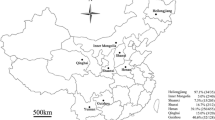Abstract
Canine hemotropic mycoplasmas occur worldwide and are caused by the uncultivable hemotrophic bacteria; Mycoplasma haemocanis (Mhc) and Candidatus Mycoplasma haematoparvum (CMhp). In this study, the occurrence and differentiation of both causative agents in dogs that originated from southern Iran were investigated by employing restriction fragment length polymorphism (RFLP)-PCR and simple multiplex PCR methods based on RNase P RNA (rnpB) and 16S rDNA markers, respectively. The results showed that the prevalence of Mhc and CMhp among 100 examined samples were 6.0 and 4.0 %, respectively. Both PCR assays provide valuable molecular tools for the differentiation of CMhp and Mhc DNA in canine blood samples compared to 16S rDNA sequencing results. Also, sequence analysis of the genes (rnpB and 16S rDNA) and subsequent phylogenetic analysis were performed for both hemoplasmas in the Iranian dogs’ population. Comparison of the Iranian sequences with those for other isolates of canine hemoplasmas deposited in the GenBank database revealed a higher interspecific variability for rnpB marker (up to 31.22 %) compared to 16S rDNA sequence (up to 17 %).




Similar content being viewed by others
References
Barker EN, Tasker S, Day MJ, Warman SM, Woolley K, Birtles R, Georges KC, Ezeokoli CD, Newaj-Fyzul A, Campbell MD, Sparagano OA (2010) Development and use of real-time PCR to detect and quantify Mycoplasma haemocanis and “Candidatus Mycoplasma haematoparvum” in dogs. Vet Microbiol 140:167–170
Brinson JJ, Messick JB (2001) Use of a polymerase chain reaction assay for detection of Haemobartonella canis in a dog. J Am Vet Med Assoc 218:1943–1945
Criado-Fornelio A, Martinez-Marcos A, Buling-Sarana A, Barba-Carretero JC (2003) Presence of Mycoplasma haemofelis, Mycoplasma haemominutum and piroplasmids in cats from southern Europe: a molecular study. Vet Microbiol 93:307–317
Dantas-Torres F (2008) The brown dog tick, Rhipicephalus sanguineus (Latreille, 1806)(Acari: Ixodidae): from taxonomy to control. Vet Parasitol 152:173–185
Greene CE (2012) Infectious diseases of the dog and cat, 3rd edn. Saunders, Philadelphia, pp 310–319
Haas ES, Banta AB, Harris JK, Pace NR, Brown JW (1996) Structure and evolution of ribonuclease P RNA in Gram-positive bacteria. Nucleic Acids Res 24:4775–4782
Harasawa R, Orusa R, Giangaspero M (2014) Molecular evidence for hemotropic mycoplasma infection in a Japanese badger (Meles meles anakuma) and a raccoon dog (Nyctereutes procyonoides viverrinus). J Wildl Dis 50:412–415
Hoelzle LE (2008) Haemotrophic mycoplasmas: recent advances in Mycoplasma suis. Vet Microbiol 130:215–226
Hoelzle K, Winkler M, Kramer MM, Wittenbrink MM, Dieckmann SM, Hoelzle LE (2011) Detection of Candidatus Mycoplasma haemobos in cattle with anaemia. Vet J 187:408–410
Messick JB (2004) Hemotrophic mycoplasmas (hemoplasmas): a review and new insights into pathogenic potential. Vet Clin Pathol 33:2–13
Messick JB, Cooper SK, Huntley M (1999) Development and evaluation of a polymerase chain reaction assay using the 16S rRNA gene for detection of Eperythrozoon suis infection. J Vet Diagn Investig 11:229–236
Nishizawa I, Sato M, Fujihara M, Sato S, Harasawa R (2010) Differential detection of hemotropic Mycoplasma species in cattle by melting curve analysis of PCR products. J Vet Med Sci 72:77–79
Novacco M, Meli ML, Gentilini F, Marsilio F, Ceci C, Pennisi MG, Lombardo G, Lloret A, Santos L, Carrapiço T, Willi B (2010) Prevalence and geographical distribution of canine hemotropic mycoplasma infections in Mediterranean countries and analysis of risk factors for infection. Vet Microbiol 142:276–284
Peters IR, Helps CR, McAuliffe L, Neimark H, Lappin MR, Gruffydd-Jones TJ, Day MJ, Hoelzle LE, Willi B, Meli M, Hofmann-Lehmann R (2008) RNase P RNA gene (rnpB) phylogeny of hemoplasmas and other Mycoplasma species. J Clin Microbiol 46:1873–1877
Sashida H, Suzuki Y, Rokuhara S, Nagai K, Harasawa R (2014) Molecular demonstration of hemotropic mycoplasmas in wild Japanese monkeys (Macaca fuscata). J Vet Med Sci 76:97
Sharifiyazdi H, Hasiri MA, Amini AH (2014) Intravascular hemolysis associated with Candidatus Mycoplasma hematoparvum in a non-splenectomized dog in the south region of Iran. Vet Res Forum 5:243
Sykes JE (2014): Canine and feline infectious diseases. 1st edn, Elsevier, pp 391–392.
Sykes JE, Ball LM, Bailiff NL, Fry MM (2005) Candidatus Mycoplasma haematoparvum, a novel small haemotropic mycoplasma from a dog. Int J Syst Evol Microbiol 55:27–230
Tamura K, Stecher G, Peterson D, Filipski A, Kumar S (2013) MEGA6: molecular evolutionary genetics analysis version 6.0. Mol Biol Evol 30:2725–2729
Tasker S, Helps CR, Day MJ, Harbour DA, Shaw SE, Harrus S, Baneth G, Lobetti RG, Malik R, Beaufils JP, Belford CR (2003) Phylogenetic analysis of hemoplasma species: an international study. J Clin Microbiol 41:3877–3880
Torkan S, Aldavood SJ, Sekhavatmandi A, Moshkelani S (2014) Detection of haemotropic Mycoplasma (Haemobartonella) using multiplex PCR and its relationship with epidemiological factors in dogs. Comp Clin Pathol 23:669–672
Wengi N, Willi B, Boretti FS, Cattori V, Riond B, Meli ML, Reusch CE, Lutz H, Hofmann-Lehmann R (2008) Real-time PCR-based prevalence study, infection follow-up and molecular characterization of canine hemotropic mycoplasmas. Vet Microbiol 126:132–141
Author information
Authors and Affiliations
Corresponding author
Ethics declarations
Ethical approval
This experiment was performed under the approval of the state committee on animal ethics, Shiraz University, Shiraz, Iran. In addition, the recommendations of European Council Directive (86/609/EC) of November 24, 1986, regarding the protection of animals used for experimental purposes, were also considered.
Funding
This study was funded by Research Council of Shiraz University and School of Veterinary Medicine, Shiraz University (Grant No. 87-GR-VT-47).
Conflict of interest
The authors declare that they have no conflict of interest.
Rights and permissions
About this article
Cite this article
Sharifiyazdi, H., Abbaszadeh Hasiri, M. & Radmanesh, M. Development of RFLP-PCR and simple multiplex PCR assays for detection and differentiation of two species of hemotropic mycoplasmas in naturally infected dogs. Comp Clin Pathol 25, 847–853 (2016). https://doi.org/10.1007/s00580-016-2272-7
Received:
Accepted:
Published:
Issue Date:
DOI: https://doi.org/10.1007/s00580-016-2272-7




